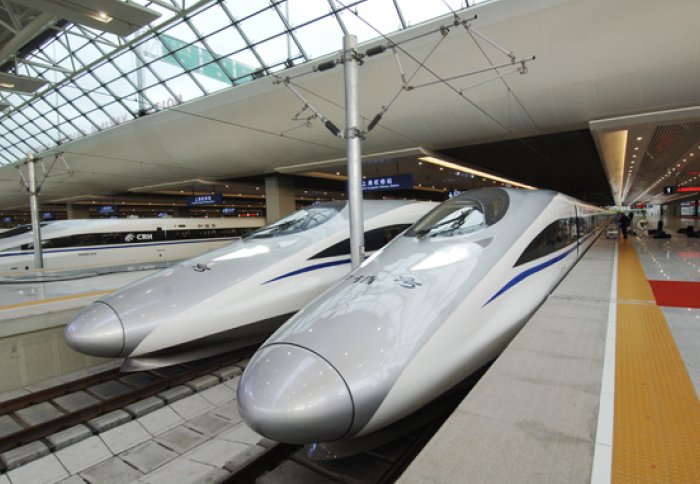New partnership on track to deliver advanced trains of the future
by Colin Smith

High speed train developed by CSR
A new partnership is focusing on making the next generation of high speed trains, supported by the latest manufacturing and monitoring technologies.
Imperial College London has joined with China South Railway (CSR) Sifang Corporation - a rolling stock manufacturer that is the world’s largest maker of electric locomotives – to establish the Sifang-Imperial Centre for Rail Transportation Manufacturing Technologies.
We are enormously excited to be working with CSR Sifang on high speed rail projects that could ultimately make people more connected.
– Professor Jianguo Lin
Department of Mechanical Engineering
The Centre will focus on developing rail technologies to streamline the construction and testing of high speed trains, so that they are safer, more cost effective and environmentally friendly. Using the latest manufacturing techniques, the researchers aim to create trains that are made from advanced materials and fewer components, making them lighter and more fuel efficient.
The new Centre will be based in the Department of Mechanical Engineering and headed by Professor Jianguo Lin, a world-leading expert in using materials processing and moulding or plasticity technologies for the production of structural components, with applications in the transport industry.
Professor Lin said: “Plans for new high speed rail links in the UK have really shone the spotlight on the advantages of travelling by rail. Not only can railways rapidly move large groups of people from one point to another, they can also join up different communities along their routes, which can lead to places becoming more dynamic and competitive. However, in order to truly reap the benefits of the next generation of rail travel, more work needs to be done to make trains lighter and durable, so that they are more cost effective to make and efficient to run, and are cleaner in environmental terms. We are enormously excited to be working with CSR Sifang on high speed rail projects that could ultimately make people more connected.”

Professor Alice Gast, President of Imperial, with Mr Jun Wang, CSR Vice President
The researchers at the Centre will further develop advanced forming techniques that should enable the railway manufacturer to make complex shaped structural panel components that are lightweight and ultra-high strength. This should enable the trains to be made from fewer components, making their construction more cost effective with increased structural integrity. The researchers will also investigate new methods for joining these next-generation lightweight materials together and monitoring the performance of safety critical components, such as wheels and shafts.
The team will also focus on improving technologies to assess the wear and degradation of train components. This will enable engineers to more accurately predict when components are likely to degrade, so that they can be replaced at the right time to avoid failure, improving efficiencies in maintenance and increasing overall rail safety.
The Centre is part of the Faculty of Engineering’s initiative to promote multi-disciplinary manufacturing research, led by the Manufacturing Futures Lab. The lab brings together academics in future manufacturing technologies and underpinning science to develop a more coherent and strategic programme in manufacturing.
Article text (excluding photos or graphics) © Imperial College London.
Photos and graphics subject to third party copyright used with permission or © Imperial College London.
Reporter
Colin Smith
Communications and Public Affairs